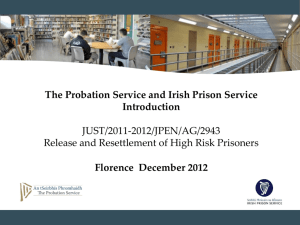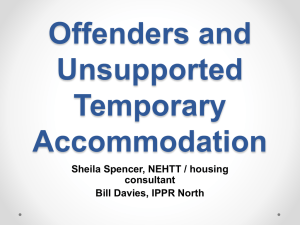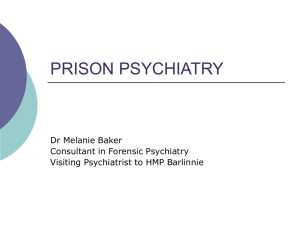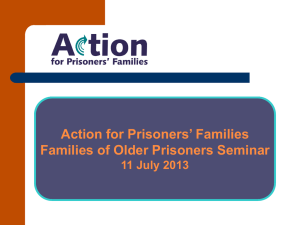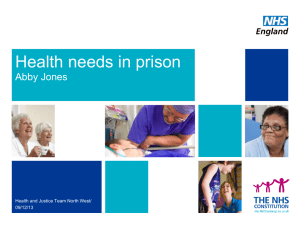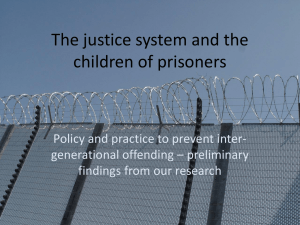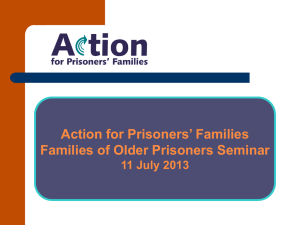current political context
advertisement
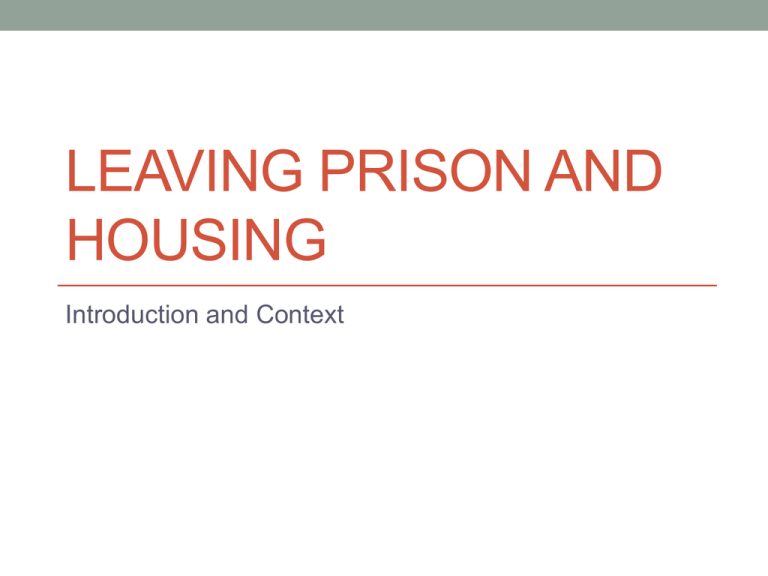
LEAVING PRISON AND HOUSING Introduction and Context Key Statistics • Ministry of Justice found that 15% of prisoners had no accommodation prior to imprisonment • One third say they have nowhere to go on leaving prison • 79% of prisoners who were homeless before custody reoffend within one year; 47% of those who were not homeless • Stable accommodation reduces risk of re-offending by 20% Local Authorities and Homelessness • Local authorities often have no statutory duty to house homeless former prisoners • In Liverpool during 2010-11 four people accepted as statutorily homeless due to leaving prison • In 2003, almost 1,000 former prisoners found to be statutorily homeless, but out of possible 26,000 • Local authorities provide specific funding for accommodation related support A long history of initiatives • 1991 Criminal Justice Act sought to bring about ‘throughcare’ • HMIP (2001) found failure to co-ordinate services, particularly for short term prisoners • 2003 Criminal Justice Act created Custody Plus and Intermittent Custody, but not implemented • 2003 Carter Review recommended creation of NOMS to ‘break down the current silos of prison and probation’ A long history of initiatives –part 2 • 2004 Reducing re-offending National Action Plan identified housing as one of seven reducing re-offending pathways • 2006 Home Office made ‘meeting the housing needs of offenders’ part of its 5 year strategy • NOMS set target of ensuring 90% of prisoners had their housing need assessed within 4 days of being sent to prison (100% in the North East) The role of the Third Sector • Third sector organisations contracted to provide housing advice and support in prisons • 2010 Green Paper Breaking the Cycle suggested working with Crisis to access the private rented sector Transforming Rehabilitation White Paper • “What we do at the moment is send people out of prison with £46 in their pocket, and no support at all. The proposals will see all of those sentenced to prison or probation properly punished while being helped to turn away from crime for good. They will also mean taxpayers' money is only spent on what works when it comes to cutting crime.” (MoJ) • Key concern was over lack of statutory obligation to support those imprisoned for less than one year • Pledged to establish a nationwide ‘through the prison gate’ resettlement service to give offenders continuity of support 2014 Offender Rehabilitation Act • 21 Community Rehabilitation Companies (CRCs) to manage the majority of offenders in Contract Package Areas (CPAs), with the highest risk offenders managed by the National Probation Service • All prisoners to be supervised for at least one year after release • CRCs to create & implement resettlement plans with offenders in prison which include helping to find accommodation • Majority of prisoners to serve last part of their sentence in resettlement prisons designated to their home area Find out more Cooper, V. (2013) No Fixed Abode, Howard League for Penal Reform, available from http://www.howardleague.org/publications-resettlement/ Gojkovic, D. Mills, A. and Meek, R. (2012) Accommodation for Ex-offenders, Third Sector Research Centre at: http://www.birmingham.ac.uk/generic/tsrc/research/servicedelivery/criminal-justice/wp-77-accommodation-exoffenders.aspx Harding, A. and Harding, J. (2006) Inclusion and Exclusion in the Re-housing of Former Prisoners, Probation Journal 53 (2), pp. 139-155 Ministry of Justice (2014) Target Operating Model: Version 3 Rehabilitation Programme at http://www.justice.gov.uk/downloads/rehabprog/competition/target-operating-model-3.pdf


